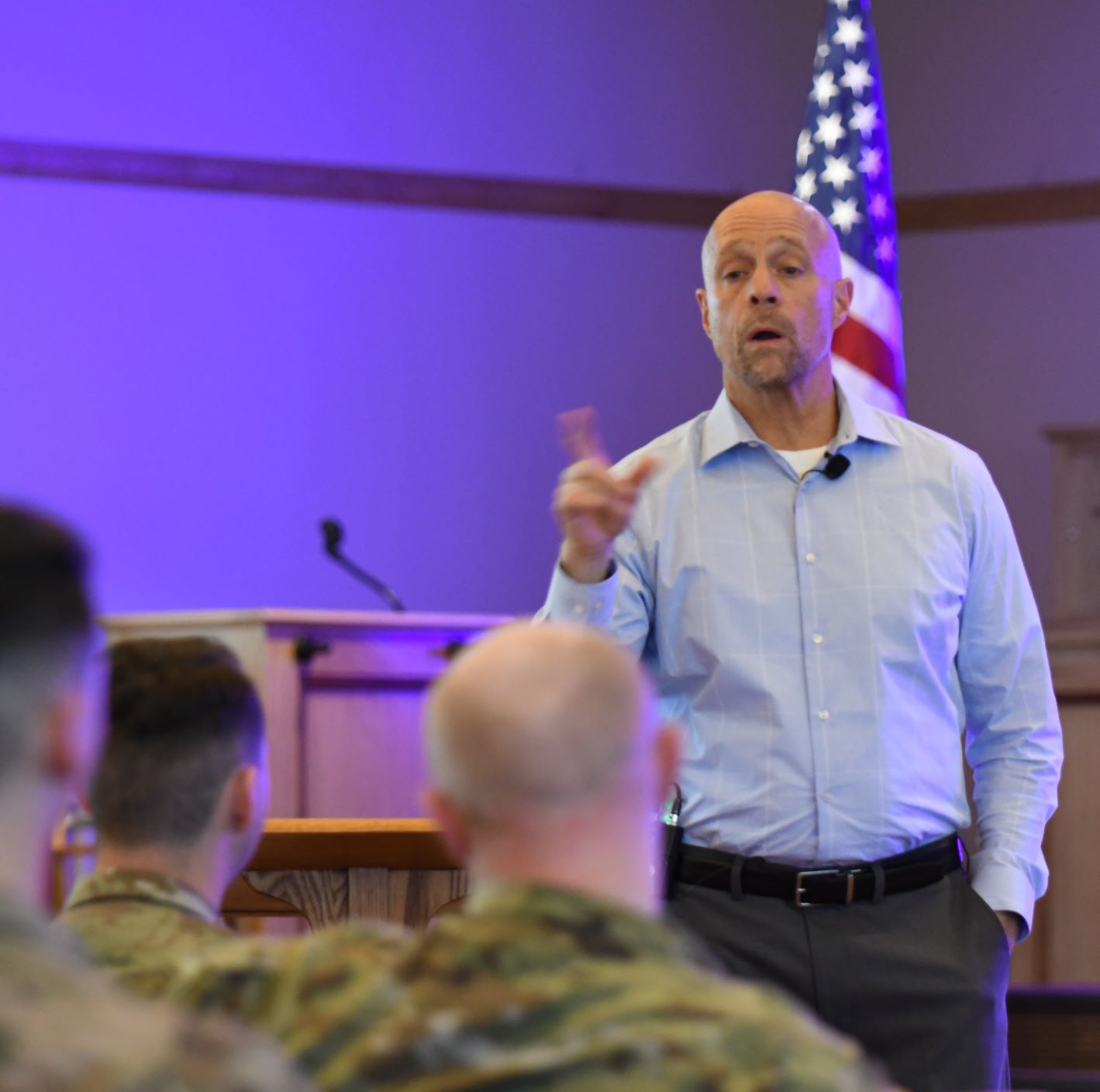
David Woods Bartley, a mental health advocate and suicide prevention educator, spoke with hundreds of Fort Drum Soldiers, family members and civilian employees during a weeklong series of presentation on suicide and mental illness at the Main Post Chapel. (Photo by Mike Strasser, Fort Drum Garrison Public Affairs)
Advocate, educator on mental health and suicide delivers message of hope to post community
Mike Strasser
Fort Drum Garrison Public Affairs
FORT DRUM, N.Y. (May 6, 2022) – “Hope changes everything – hope wins always,” said David Woods Bartley, a mental health advocate and suicide prevention educator, speaking to a Main Post Chapel audience May 5 at Fort Drum.
It was a message he delivered repeatedly during a weeklong series of presentations on suicide and mental illness to more than 1,200 Soldiers, family members and civilian employees.
Bartley said that the military tends to look at suicide intellectually – and that it is good at the scientific approach. However, he said that suicide is a malady of thought and feelings, and that it is time to try a different way of addressing the problem.
“Now, the Army is not really known for talking about feelings,” he said. “I think one of the reasons there are so many suicides, and not just in the Army, is because we are not talking about how we feel. We don’t have to be touchy-feely to actually talk about our feelings and our emotions. But this is an emotion-based malady.”
Bartley said that suicide works in a recognizable sequence.
“Thoughts that can kill you create emotions that overwhelm you, which will direct the action that will take your life,” he said. “That’s it. But connection reverses that, because connection creates different thoughts, which trigger different emotions, which influence different actions.”
Establishing connections with one another, simple acts of kindness – a smile, addressing someone by their name or asking someone about their day – can make all the difference in a person’s state of mind.
Bartley said it can create hope, and hope saves lives.
“If we harness – if the Army harnesses – hope as a weapon, we can defeat this,” he said. “I’m not kidding. What you can do will save lives.”
Bartley spoke of his own attempt to kill himself, describing the detailed steps he made in selecting the spot where he parked his car, how he placed a suicide note to his wife on the dashboard and then left the car keys on top of it before walking to the edge of a bridge.
“When people attempt to, or do in fact, kill themselves, I think the societal response, or what they imagine, is that the person had a death wish,” he said. “They just wanted to die. Nothing could be further from the truth. What happens is, living in that moment becomes more difficult than dying.”
Bartley said that people inherently do not want to die, but an unbearable amount of pain and trauma defeats the instinct of survival.
“It takes a lot of suffering to get to that point, and that’s how I felt that day,” he said.
When he was moments away from a 730-foot fall, Bartley paused only to question how the impact would feel. He said that he already had searched online for the time it would take to fall that distance, but he didn’t know if there would be pain. That pause was long enough for a bystander to intervene and call 911. Bartley said the connection established by the sheriff’s deputy, then the emergency medical technician inside the ambulance and the psychiatrist at the hospital were what ultimately led him on a path of hope and healing.
“Connection, connection, connection – this is the way,” he said. “Connection, as defined by Dr. Brene Brown, is the energy that exists between people when they feel seen, heard and when they feel valued. When they can give and receive without judgment, and when they derive strength and sustenance from the relationship.”
Bartley quoted Dr. Drew Ramsey, a psychiatrist and author, who said “Someone you see today is thinking about killing themselves. Your smile, your question, your love could save them. Trust me. They told me it did.”
“We have the answer, we just don’t do it enough,” Bartley said. “If we do this, we will win this fight.”
Throughout the week, Bartley spoke with members of each 10th Mountain Division (LI) brigade, health care and support services professionals, and students at a local school, and he made himself available for one-on-one consultations with community members.
Chaplain (Lt. Col.) Matthew Atkins, 10th Mountain Division (LI) chaplain, said the speaker series is a way to approach suicide prevention in an introspective way and to rethink how it is addressed holistically at Fort Drum.
“I’ve been in the Army for 30 years, and I’ve seen the same kind of resources thrown at suicide prevention from day one,” he said. “The thought was if we become so good at knowing the signs and symptoms of suicides, then maybe we could get ahead of this. But that hasn’t changed the picture much with regards to suicide.”
In February, the 10th Mountain Division (LI) Chaplains Section invited Fort Drum community members to a Spiritual Readiness Breakfast where they heard from another leading expert on suicide prevention, who also urged community members to connect with one another and embrace human kindness.
“I think the Army has caught on to the power of connection,” Atkins said. “It’s probably something we’ve always known, but in the tyranny of the urgent – as we move on from one task to another – we can forget how powerful connections can be.”
The Suicide Prevention Program is located in the Soldier and Family Readiness Center, Bldg. 10250, on 4th Armored Division Drive. For more information, call (315) 772-9018.
If you or someone you know needs help, call the National Suicide Prevention Lifeline at 1-800-273-8255 (press 1 for the Military Crisis Line).





